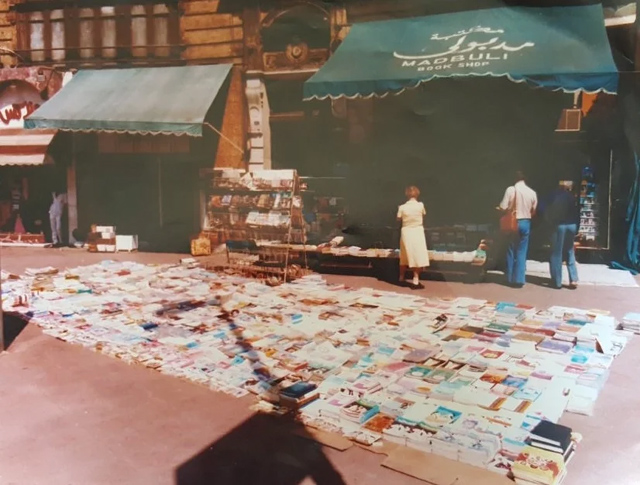TROPIC OF CANCER SERIES Report: Here are some of the oldest places to buy books in Cairo. Whether it’s vintage maps, film posters or photographs, a tour of the Egyptian city’s bookshops can also reveal much about its past.
By Bahira Amin in the Middle East Eye: Cairo’s literary history is long and complex, with many bookshops launched as accompaniments to the country and the region’s first publishing houses. Dar El Maaref, for instance, is the oldest Egyptian publishing house, established in 1890, with the first branch of its bookshops opening in 1910, and still standing today in Ramses. A search for the city’s oldest bookshops makes for quite the urban adventure. Through a millennia-old archway, hundreds of leather-bound volumes are stacked floor to ceiling. Known in Arabic as Soor el-Azbakeya, the Azbakeya Wall market encompasses 132 bookshops selling books as well as vintage newspapers and posters.
Or turn away from one of Cairo’s most iconic roundabouts and you’ll discover – between a travel agency and an electronics store – a 19th century orientalist’s library, replete with jaw-dropping first editions and vintage maps.
Above one of the city’s busiest metro stations, affordable prints and one-of-a-kind collectors’ items burst out of the 132 used book stores that sprawl through a book market over a century old.
It’s an eye-opening walking tour, made a little easier by the fact that in Cairo’s older neighborhoods, independent shops of the same kind are usually huddled together. For books, that means right behind al-Azhar Mosque, across the street from the historic Khan el-Khalili souk, along Abd el-Khalik Tharwat Street in downtown Cairo, a few minutes away from Tahrir Square, and scattered around the iconic sprawl of Soor el-Azbakeya (the Azbakeya Wall Book Market). While the stores featured in the following list are remarkable testaments of resilience – with most surviving through the waning years of British occupation; the last Egyptian monarchs; a new age of state-building, as well as decades of economic reconstruction; war and revolution right outside their doors, and inevitable industry upheaval – others have been less fortunate.

Madbouly Bookshop
Established in 1951, Madbouly Bookshop on Talaat Harb Square is the youngest spot on this list, at a mere 70-years old. The story of Haj Madbouly, the illiterate publisher who went from newspaper salesman to one of Cairo’s literary heavyweights, is still a favorite among the booksellers of downtown Cairo, affectionately relayed whenever any of them are asked about the history of bookshops in the area.
Hajj Madbouly had started working with his father in 1944, selling books and magazines when he was just six-years old. In 1951, the family began renting a newspaper kiosk on Talaat Harb Square, where he and his brother would work in shifts. By 1958, the business had expanded to rent the landmark store, as well as a small publishing house feeding what Madbouly called an intellectual renaissance.
“We started publishing after the Suez Canal crisis [of 1956],” Madbouly said in an interview a few years before his death in 2008. “The revolution had invigorated intellectual and cultural life, and there was suddenly this large cultural movement that would produce the iconic Egyptian thinkers that we know today… The General Egyptian Book Organisation would publish a book every six hours, and it would immediately sell out.”
After first starting with translations of the works of Jean Paul Sartre, Albert Camus and Samuel Beckett, the publisher went on to put out thousands of releases, including by Nawal el-Saadawi, Gamal el-Ghitani and Mohamed Hassanein Heikal. After the defeat of 1967, Madbouly became known for selling and publishing books banned by the Nasserist government.
Today, the store – now owned and managed by Mohamed Madbouly, Hajj Madbouly’s son – carries new publications in Arabic literature and research. A closer eye, however, reveals the remnants of decades-old prints that never sold out, including beautiful poetry collections in ornate hardcovers and fascinating niche historical scholarship.
The following are some of the city’s oldest, iconic bookshops,, where you can hold an 18th century edition of Voltaire in your hands, retrace the literary salons of Naguib Mahfouz and Taha Hussein, comb through rare vintage prints, and have the books you’ve picked up leather-bound at one of the city’s last surviving bookbinders. More here>
RELATED:

ALSO READ:
Rudolf Lehnert’s ‘Bahira’: One Picture, Two Stories
The Persistence of Pyramids
The Great Pyramids and Wireless Electric Energy






